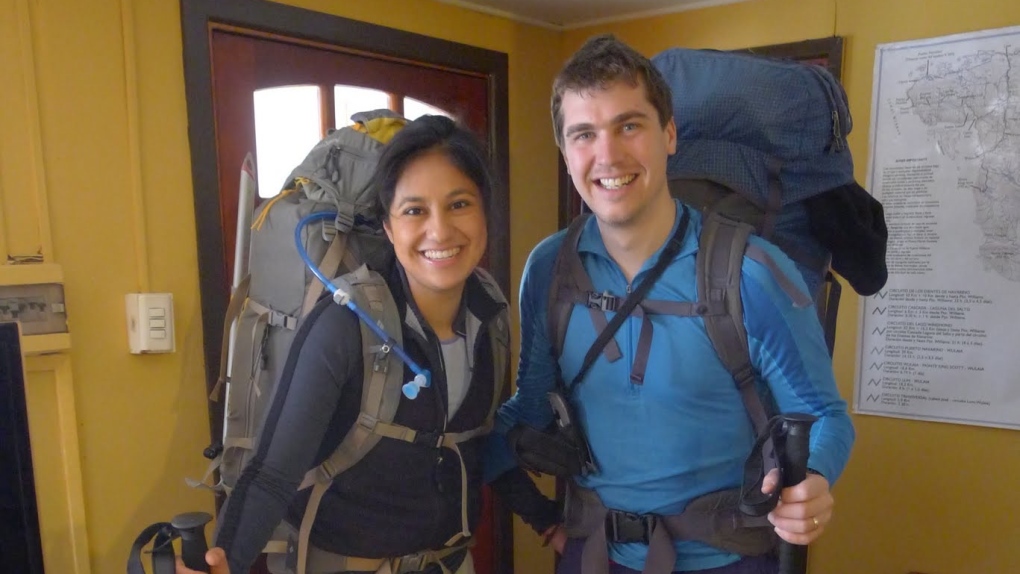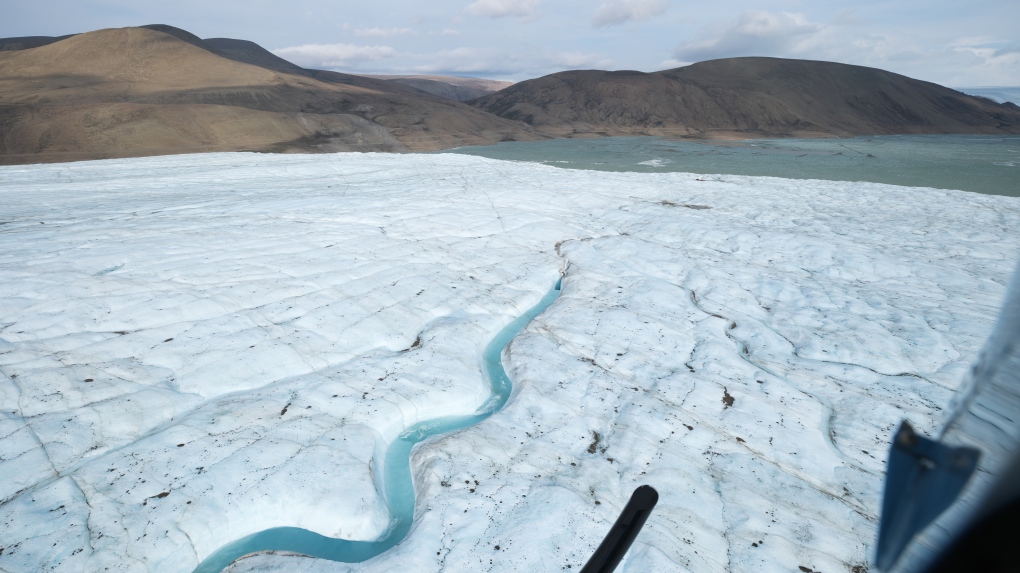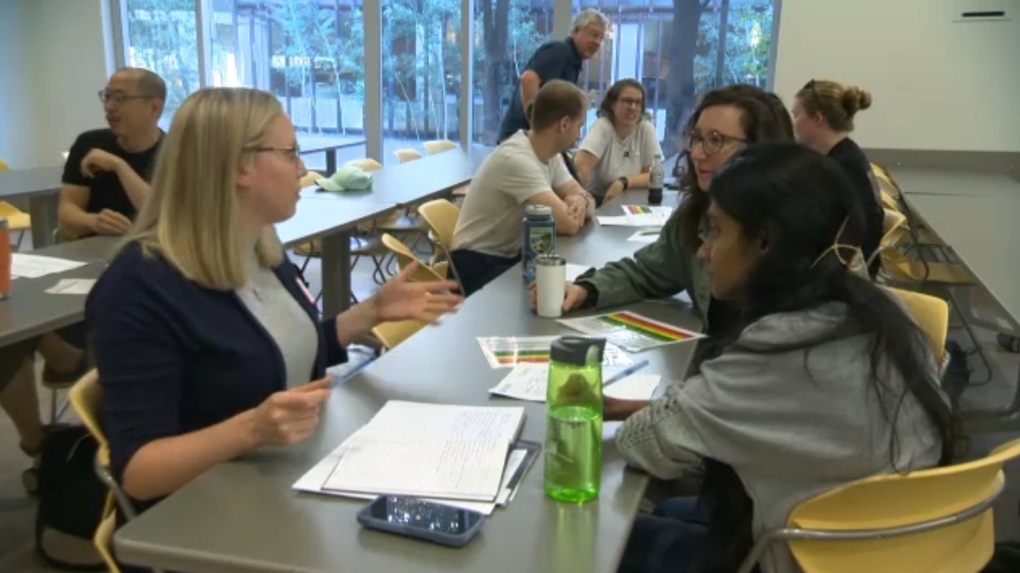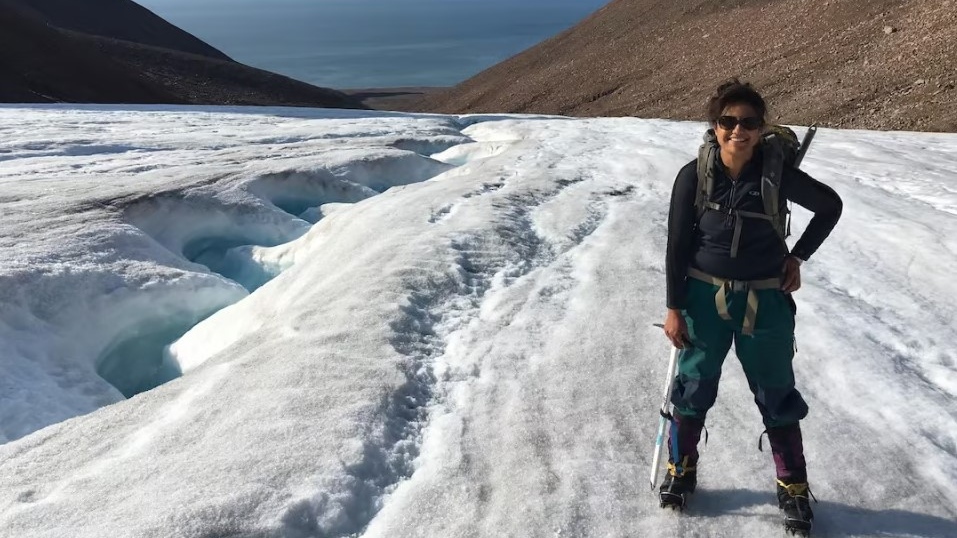Fatality prompts the University of Alberta to enhance safety protocols for field researchers
One year ago, an esteemed arctic climate researcher died while conducting field work in a remote part of the Canadian arctic, prompting the University of Alberta to review and enhance its safety protocols for field researchers.
According to her husband, Dr. Maya Bhatia – a biogeochemist and tenured associate professor – was collecting a water sample from a glacier in Grise Fiord, Nunavut when she slipped and fell into a stream.
“Maya jumped out of the helicopter. It landed. It couldn't stop its rotors because it was slippery, the surface,” Ben Gready recently told CTV News Edmonton.
“She went up to the stream to take a sample with a bottle, that she would do some chemical analysis on back in the lab, and she slipped and there was nothing to purchase on.”
Gready said he heard from the student and the helicopter pilot accompanying Bhatia, she was swept into a channel and down a moulin – a vertical shaft in the ice.
“I knew how final that was,” he said.
Gready – a former glaciologist himself – met his late wife in 2008 when he was hired as her field assistant.
 Maya Bhatia and her husband Ben Gready in an undated photo. (Source: Bhatia family)
Maya Bhatia and her husband Ben Gready in an undated photo. (Source: Bhatia family)
“She was bubbly, fun,” he said. “She would fill a room with her character.”
The two wed in 2014 and have two children together who are eight and nine years old.
“She loved her kids more than anything.”
‘Under far too much pressure’: husband
At the time, Gready said his wife was working 18-hour days, leading students on a complex project, sharing helicopter time with other researchers.
“There had been a helicopter accident that summer, earlier in the summer, and so they were operating under more pressure than would usually be the case.”
He said the 44-year-old wasn’t wearing proper safety equipment – crampons, a rope or a harness – when she stepped out on the ice.
“When you have the person who has spilled their life into the research and who needs that next sample to get their paper out, especially when the number of papers that you produce and number of publications you produce in a year dictates your pay rises and the respect of your colleagues, etc. When that same person is making the in-the-moment safety decisions…it's inevitable that at some point they will make the wrong decision.”
 Jakeman Glacier in Grise Fiord, Nunavut. (Source: David Didier)
Jakeman Glacier in Grise Fiord, Nunavut. (Source: David Didier)
Gready believes mandating the use of mountain guides for these types of trips would prevent a similar tragedy.
“In my opinion, crucially, that kind of independent safety person that is shutting things down if it's getting dangerous.”
U of A considering guides
The University of Alberta tells CTV News Edmonton it has used mountain guides before in geographical areas that require them such as Antarctica.
In response to Bhatia’s death, it says it is looking at options to “expand health and safety expertise” including guides.
“Every serious incident is an opportunity for us to take pause, look at all our programs and say was this sufficient? Are there gaps we can improve on?” U of A director of health, safety and environment Michelle Rooker told CTV News Edmonton.
After completing an internal investigation, the university recently introduced new safety protocols for field researchers.
They include a mandatory course – that takes about a day – to bring researchers through different scenarios they might encounter before heading out.
“To take a look at all of the documentation and the tools that we've prepared to ensure safety and put them into some real-life kind of tests,” Rooker said.
 In-person portion of mandatory safety course for U of A field researchers on July 30, 2024. (CTV News Edmonton)
In-person portion of mandatory safety course for U of A field researchers on July 30, 2024. (CTV News Edmonton)
She said the university also developed a “no-go tool” to use in situations where conditions can change rapidly.
“Weather is a huge factor. So to give them a tool that allows them to assess those changing conditions and make safety decisions dependent upon that was a really important part of our work.”
Family denied access to fatality report
Bhatia’s family has been pushing to see reports into her death but have been told “no” numerous times.
“In the interest of transparency it should be shared with us. I don’t know what they want to hide,” Bhatia’s father Ramesh tells CTV News Edmonton.
Her parents believe without complete transparency, there won’t be meaningful change.
“All I am seeking is that it does not happen to two other little children, to any husband and to parents and brother and family members again,” said Ramesh.
 Dr. Maya Bhatia in an undated photo. (Source: Bhatia family)
Dr. Maya Bhatia in an undated photo. (Source: Bhatia family)
The university said it is “in touch” with the family and is “hopeful” about finding a resolution to the fatality report dispute.
It also said it won’t release the report publicly due to “privacy considerations and ongoing processes”.
The Workers’ Safety and Compensation Commission (WSCC) of the Northwest Territories and Nunavut confirmed to CTV News Edmonton an investigation into Bhatia’s death was completed and it will not be laying charges.
CTVNews.ca Top Stories

Poilievre writes to GG calling for House recall, confidence vote after Singh declares he's ready to bring Liberals down
Conservative Leader Pierre Poilievre has written to Gov. Gen. Mary Simon, imploring her to 'use your authority to inform the prime minister that he must' recall the House of Commons so a non-confidence vote can be held. This move comes in light of NDP Leader Jagmeet Singh publishing a letter stating his caucus 'will vote to bring this government down' sometime in 2025.
At least 2 dead and 60 hurt after a car drives into a German Christmas market in a suspected attack
A car plowed into a busy outdoor Christmas market in the eastern German city of Magdeburg on Friday, killing at least two people and injuring at least 60 others in what authorities suspect was an attack.
16-year-old German exchange student dies after North Vancouver crash
A 16-year-old high school student from Germany who was hit by a Jeep in North Vancouver, B.C., last weekend has died in hospital, authorities confirmed.
Judge sentences Quebecer convicted of triple murder who shows 'no remorse'
A Quebecer convicted in a triple murder on Montreal's South Shore has been sentenced to life in prison without chance of parole for 20 years in the second-degree death of Synthia Bussieres.
Poilievre to Trump: 'Canada will never be the 51st state'
Conservative leader Pierre Poilievre is responding to U.S. president-elect Donald Trump’s ongoing suggestions that Canada become the 51st state, saying it will 'never happen.'
Canadiens executive says he has 'no concern' about members of the front office traveling to Russia
Montreal executive vice president of hockey operations Jeff Gorton said he has “no concern” about members of the Canadiens’ front office travelling to Russia with the country’s war in Ukraine ongoing.
Kelly Clarkson's subtle yet satisfying message to anyone single this Christmas
The singer and daytime-talk show host released a fireside video to accompany her 2021 holiday album, “When Christmas Comes Around” that she dubbed, “When Christmas Comes Around…Again.
School custodian stages surprise for Kitchener, Ont. students ahead of holiday break
He’s no Elf on the Shelf, but maybe closer to Ward of the Board.
Speeding drivers get holiday surprise from 'Officer Grinch'
Drivers in the Florida Keys who exceed the speed limit in school zones may run into a well-known gloomy green creature and get a surprising 'gift.'

































